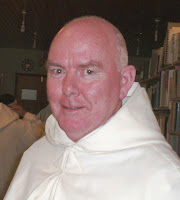 |
| 'His name is John' Cistercian Breviary |
Birth
of John the Baptist,. (24 August,2012)
Homily 11.00 am
John the Baptist
is the only person outside the Holy Family to have two days set aside for him
in the Church’s universal calendar. He
is obviously an important person in the life of the Church. John links the two Testaments. He is born in the Old to prepare the way for
the New. In later life John comes over
in the gospels as rather a fierce character.
Films, plays, and even opera have portrayed him as a wild man, even a
fanatic. It makes for good theatre.
There are people
who preach religion but for all their fine words reveal only themselves. There are others who never get in the way of
their message but point beyond
themselves. John was caught up by his
love for God and the desire he had to bring the hearts of people back to
God. However blunt his words, he did not
claim anything for himself. John was
humble. When he recognised Jesus, John
knew his work was nearly over. “He must
grow greater”, he said and, “I must grow less.”
John knew when to let go.
As an only child
born to elderly parents who had long ago given up hope of having a family, John
the Baptist must have been a much-loved child.
At the same time it is very likely that he was a spoiled one as well. . Elizabeth
and Zechariah knew that their son was even more special than other
children. The meaning of his name is
“God’s gracious gift”. The name, John,
broke with the tradition of his family and yet both father and mother had
independently picked it. They were of
course inspired by the Holy Spirit
The people
throughout the area were speaking about the unusual circumstances of his
birth. He was quite a little
celebrity. And it was the same when he
began his ministry. Crowds flocked to
him and, for a while, he was again a celebrity.
This time the whole of Jerusalem were talking about him. Some were saying openly that he was the
Messiah. Talk like this could go easily
to a man’s head.
And yet, somehow
John was aware, deep within himself, that he was not the one the people thought
he was. He knew that there was one
coming after him who was more important than he was and that his job was to
step aside and make way for him...This labour without reward or recognition must
have been hard at times. As he lay in
prison hearing about the crowds now following Jesus, he must have wondered if
he had toiled in vain and had exhausted himself for nothing. Surely there must have been times in that
prison when he hankered again for his younger days when people were over-awed
by him and he was both popular and successful.
John’s
experience is a kind of model for all those whose best days are behind
them. Men and women who were once
well-known and had succeeded in their lives, inevitably have to give way to
others younger than themselves.
We should
remember such people as they try to cope with the changed circumstances in
their lives. They are not now useless,
simply that their circumstances have changed.
They do need to adapt to a changed reality where their usefulness is not
ended but different. They can always do
something else. And, if that becomes too
difficult, they can certainly be
themselves.
John himself
remains a model for us in that he shows that we can and should step aside so
that Christ is the one who stands first in our lives. We find Christ when the time comes for us to
step back and let the other people in our lives and our work move into a more
central role.
John let go when
the time came, and - with his help - so can we!












